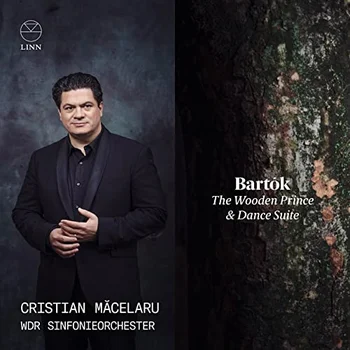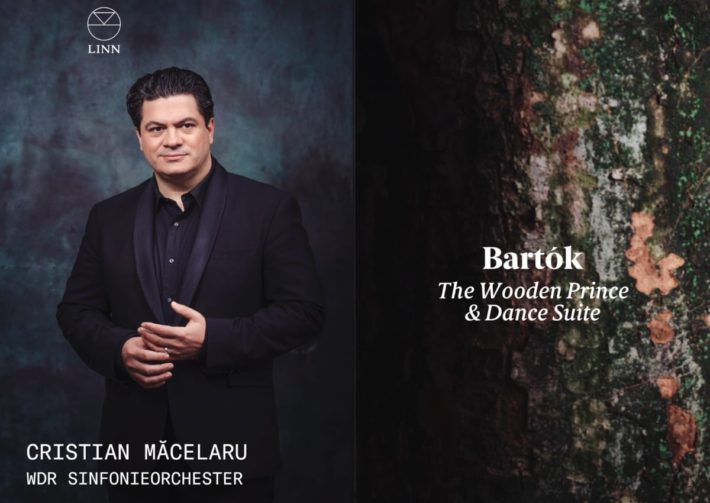This is Linn’s second album featuring this partnership. Their first release in September 2022 features finely played and superbly recorded performances of Dvořák‘s Legends and Czech Suite, that nevertheless lack the natural fluency of the Czech Philharmonic and Charles Mackerras on Supraphon. I approached this new album fearful of something similar, but Măcelaru proves to be more fully attuned to Bartók‘s style and sound world.

The opening of ‘The Wooden Prince’ is wonderfully atmospheric, wind solos suitable unnerving. Măcelaru is significantly slower here, taking 5’39” versus Kocsis (3’17”), Mälkki (4’41”), Neeme Jarvi (4’58”), and Boulez/Chicago (5’14”). Yet it never feels slow, thanks to Linn’s exceptional engineering, which engulfs the listener in the remarkable colors of Bartok’s score, still revealing the influences of Strauss and Debussy. Măcelaru makes no attempt to downplay these influences, encouraging fulsome Straussian heft in ‘The Dance of the Princess in the Forest’ (Tr. 3) and more delicate Impressionistic hues for ‘The Dance of the Waves’ (Tr. 5), the subtle blending of celesta and saxophone beautifully caught. The following dance (where the princess partners with the wooden prince) is more recognizably Bartókian, and the sounds changes again, leaner and more acerbic.
More importantly, Măcelaru is focused on telling the story. This reading truly conveys the human prince’s sorrow after watching the princess dance with his wooden replacement (Tr. 8). How beautifully we sense that sorrow shifts to hope when the princess sees his pain, and takes an interest in him (Tr. 11). The gentle ending (with ‘the two lovers gazing into each other’s eyes) is particularly touching.
Kocsis’s performance, with the Hungarian National Philharmonic Orchestra (Hungaroton) is also an emotional reading, but his reading is significantly faster, with more pungent sound, less luxuriant. Fisher’s recording with the Budapest Festival Orchestra has the variety of color and weight heard here, with a momentum and vivid characterization like Kocsis, but it is only the Suite, which means a loss of roughly 20 minutes of music. Boulez’s DG recording has the Chicago Symphony on tremendous form, but Boulez’s interpretation is cooler and less emotionally engaging. Neeme Jarvi’s Philharmonia recording engages the emotions, but the Chandos engineering is a tad over-reverberant, resulting in an occasional loss of orchestral detail. Comparing these various factors, Măcelaru and the WDR Sinfonieorchester become a prime recommendation.
Written to celebrate the 50th anniversary of the merging of the towns of Buda and Pest, the six-movement Dance Suite is one of the composer’s best-known works, with almost 80 recordings currently available. The first five movements use Arabic, Wallachian, and Hungarian dance melodies, capped off by a finale that closes the suite with a moody but vigorous bravado. Again, the playing of the WDR Sinfonieorchester is consistently characterful and impressive, but Măcelaru’s approach is rather relaxed, lasting roughly a minute and a half longer than the recordings by Fischer, Gardner, Kocsis and Solti. Moreover, the rounder, darker coloring that suited the ballet so well seem less convincing here. Best is the ‘Molto tranquillo’ (Tr. 17), where conductor and orchestra conjure a potent and numinous atmosphere. But the faster movements, while impressively precise, are overly polite. All three Hungarian conductors (Fischer, Kocsis and Solti/Chicago) encourage razor-sharp, incisive playing and a sinewy orchestral sound, choosing tempos that inspire a wilder, uninhibited performances. Solti’s later recording with Chicago remains a firm favorite.
Linn’s SACD engineering is excellent, equaling what BIS provides for the Helsinki Philharmonic Orchestra and Susanna Mälkki in their ongoing Bartók series. The brief but informative notes cap off a very fine addition to “The Wooden Prince” catalogue.
Recommended Comparisons
Boulez | Alsop | Kocsis | Fischer
Bartòk – The Wooden Prince & Dance Suite
WDR Sinfonieorchester
Cristian Măcelaru – Conductor
Linn, CKD714



















